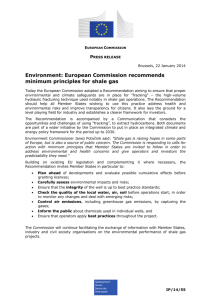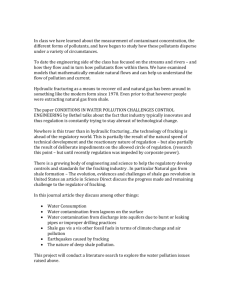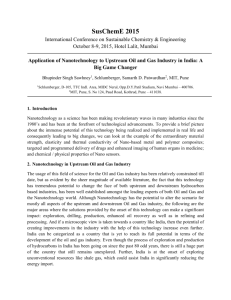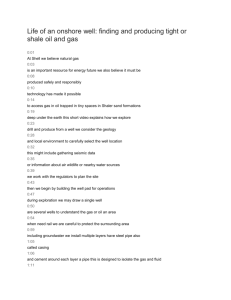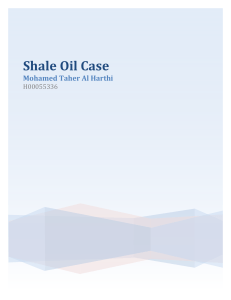Regulation of exploratory shale gas operations
advertisement
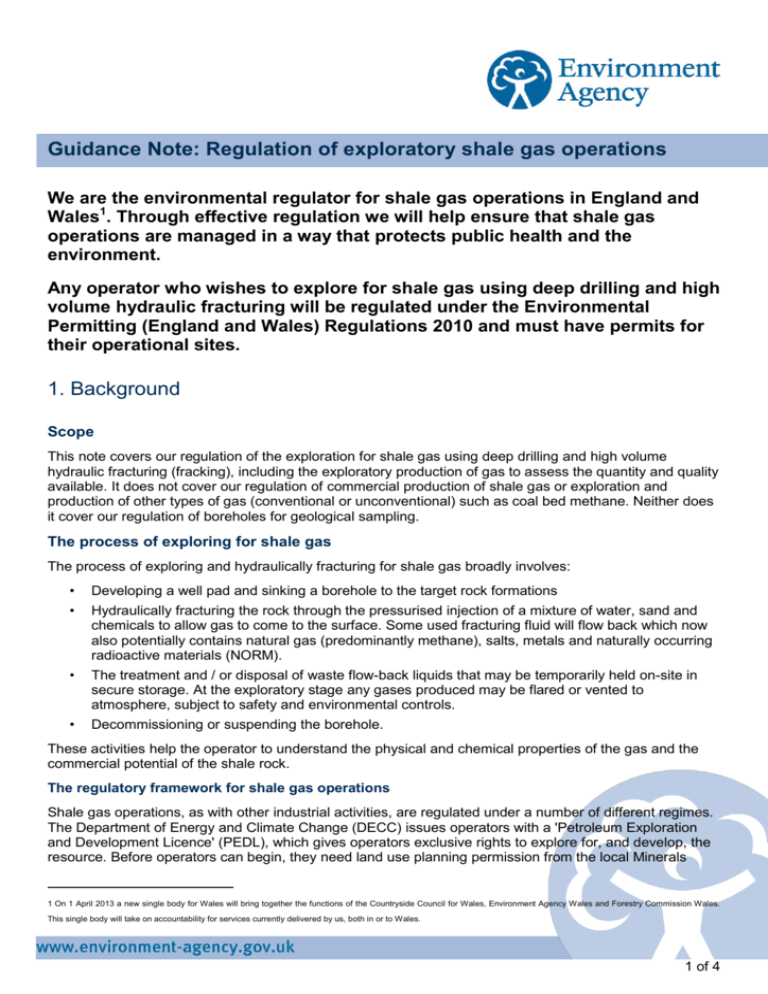
Guidance Note: Regulation of exploratory shale gas operations We are the environmental regulator for shale gas operations in England and Wales1. Through effective regulation we will help ensure that shale gas operations are managed in a way that protects public health and the environment. Any operator who wishes to explore for shale gas using deep drilling and high volume hydraulic fracturing will be regulated under the Environmental Permitting (England and Wales) Regulations 2010 and must have permits for their operational sites. 1. Background Scope This note covers our regulation of the exploration for shale gas using deep drilling and high volume hydraulic fracturing (fracking), including the exploratory production of gas to assess the quantity and quality available. It does not cover our regulation of commercial production of shale gas or exploration and production of other types of gas (conventional or unconventional) such as coal bed methane. Neither does it cover our regulation of boreholes for geological sampling. The process of exploring for shale gas The process of exploring and hydraulically fracturing for shale gas broadly involves: • Developing a well pad and sinking a borehole to the target rock formations • Hydraulically fracturing the rock through the pressurised injection of a mixture of water, sand and chemicals to allow gas to come to the surface. Some used fracturing fluid will flow back which now also potentially contains natural gas (predominantly methane), salts, metals and naturally occurring radioactive materials (NORM). • The treatment and / or disposal of waste flow-back liquids that may be temporarily held on-site in secure storage. At the exploratory stage any gases produced may be flared or vented to atmosphere, subject to safety and environmental controls. • Decommissioning or suspending the borehole. These activities help the operator to understand the physical and chemical properties of the gas and the commercial potential of the shale rock. The regulatory framework for shale gas operations Shale gas operations, as with other industrial activities, are regulated under a number of different regimes. The Department of Energy and Climate Change (DECC) issues operators with a 'Petroleum Exploration and Development Licence' (PEDL), which gives operators exclusive rights to explore for, and develop, the resource. Before operators can begin, they need land use planning permission from the local Minerals 1 On 1 April 2013 a new single body for Wales will bring together the functions of the Countryside Council for Wales, Environment Agency Wales and Forestry Commission Wales. This single body will take on accountability for services currently delivered by us, both in or to Wales. 1 of 4 Planning Authority (MPA), as well as environmental permits from us. This may involve consulting with statutory consultees, such as Natural England, Countryside Council for Wales and the Health Protection Agency. Operators must also notify and engage with DECC on the plans for the borehole and with the Health and Safety Executive (HSE) to ensure health and safety at the workplace. DECC provide operators with the final consent for hydraulic fracturing, once all other permits and permissions are in place. 2. Our role in the planning system Shale gas operators must have planning permission for their surface operations (that is the construction and operation of individual well pads) from the MPA. This is often, but not exclusively, the county or unitary council. We are a statutory consultee in the planning process and will discuss proposals and provide advice to the MPA. We will do this for pre-application enquiries, for scoping of any Environmental Impact Assessment and for the planning application itself. Where risks to the environment are significant, for example where development is proposed contrary to our groundwater protection policy and practice, we will object to the planning application. When a planning development also needs an environmental permit, we will provide advice to the MPA on permitting issues. Where a bespoke permit is needed, we will provide a more detailed response. We recommend applying for planning permission and environmental permits in parallel to avoid unnecessary delays. 3. Environmental regulation requirements We take a risk based approach to regulating shale gas activities based on the available evidence. When we process applications we take into account the applicant’s technical competence, the local characteristics of the site and any risks to the environment. We do not apply a one size fits all approach. We work closely with the other regulators of the shale gas industry, including DECC and the HSE, to ensure that regulation is joined-up, effective and efficiently delivered. We expect that shale gas developments that include hydraulic fracturing will need environmental permits under the Environmental Permitting (England and Wales) Regulations 2010 (EPR). Operators will need to notify us of their plans under the Water Resources Act 1991 (WRA 1991). Operators can avoid delay by discussing their proposals with us at the earliest opportunity. Water abstraction licensing If operators want to abstract water directly from surface water or groundwater for operational purposes, and this exceeds 20 cubic metres a day, they will need a water abstraction licence. Applications for a licence will be assessed like any other. Groundwater investigation and pumping tests that are performed as part of the application for a water abstraction licence will also need our prior consent. A licence will be granted if the quantities proposed for abstraction can be taken in a way that doesn’t harm the environment or other users. There is no guarantee that directly abstracted surface water or groundwater will be available. Notice to drill All shale gas operators must notify us of their intention to drill a borehole under WRA (1991). Operators must provide details of how they intend to protect water resources, including groundwater, in the construction and use of the borehole. If we are not satisfied, we may serve a notice on the operator to take appropriate measures to conserve water quantity and quality. 2 of 4 Groundwater activity If hydraulic fracturing takes place in a borehole that passes through groundwater we would regard the fracturing as a groundwater activity. A permit under EPR will not be required as long as we are satisfied that groundwater is protected by the controls applied by the MPA, the HSE and through the notice to drill under the WRA 1991. Should we believe groundwater to be at risk we may use a notice either to require that a permit be obtained, which would include the appropriate measures designed to minimise any impact or risk, or if necessary to prohibit the activity altogether. Only substances that have been assessed as being non-hazardous pollutants under the Groundwater Daughter Directive may be used in hydraulic fracturing fluids. Information on the chemicals used by an operator in hydraulic fracturing fluid will normally be made available to the public. We may not disclose the relative quantities in the mixture, as this is commercially confidential. The borehole must be decommissioned through sealing and/or backfilling to protect groundwater and surface waters. Mining waste operations It is likely that an operator will need a permit under EPR for managing the flow-back fluid and waste gases from hydraulic fracturing, depending on the site specific activities. The flow-back fluid and waste gases are considered mining wastes and their management is a mining waste operation, whether or not it involves a mining waste facility. As such, the operator must provide a waste management plan with their permit application. An area designated for the accumulation or deposit of flow-back fluid or waste gases may be a mining waste facility and may need to be included under the permit. The requirement for permits for the management and disposal of wastes from drilling the borehole will be treated in the same way as those from any similar minerals exploration. Radioactive substances Naturally occurring radioactive materials (NORM) are present in many geological formations including oil and gas bearing strata such as shale formations. The flow-back fluid that returns to the surface following hydraulic fracturing, as well as sediments and scales in gas or water process vessels, are likely to contain sufficient NORM that they will be classed as radioactive waste2. As such the operator must have an environmental permit for their temporary storage and subsequent treatment and disposal. Treatment and disposal may take place on-site leading to re-injection during subsequent hydraulic fracturing, or carried out at remote sites such as sewage treatment works or effluent treatment facilities. After treatment, the water may still retain some radioactivity. Its disposal to rivers, estuaries, sea or groundwater will have to be assessed for its impact on people and the environment. We consider that hydraulic fracturing during the exploration, development or exploitation of shale gas involves the production of natural gas. This is listed as a NORM industrial activity in EPR due to the likely presence of radioactive substances. Therefore a permit is needed for the disposal of the flow-back fluid if radioactive substances are present. However, simply drilling a well does not involve the production of natural gas and therefore no permit is needed for disposal of these drill cuttings under radioactive substances controls. 4. Monitoring and compliance We will work with the operator to set out how we will monitor their compliance on each site to ensure that environmental risks are properly managed. We use a variety of methods such as audits, site inspections, 2 There are concentrations of NORM that are so low that they are not subject to Schedule EPR 2010 controls. These concentrations can be found in Table 1 of Schedule 23 to EPR 2010. Concentrations below these levels are out of scope of Schedule 23 and no permit is required. However, experience suggests that, for fracking operations, this is very unlikely. 3 of 4 check monitoring and / or sampling, and reviewing operator records and procedures. We work closely with the HSE and DECC to ensure that our monitoring regimes are co-ordinated and effective. Operators must demonstrate to us that their proposed activities are not harmful to people or the environment. We may ask them to monitor the effects their activities have on the environment and report these to us, for inclusion on our public registers if appropriate. We will thoroughly inspect and monitor shale gas operations due to the relative novelty of the techniques deployed. This will help to reassure the public and local communities and help us to better understand the controls at each stage of the operation. 5. Openness and transparency - the permit application process We expect that operations to explore for shale gas involving hydraulic fracturing will need bespoke environmental permits. We advise operators to discuss their proposals with us and apply for a permit as early as possible, and before any operations commence on site. We will process permit applications as quickly as possible. Operators can help speed this up through early discussions and by working closely with our staff to provide the information we need. To make this easier we have established a shale gas unit as well as local single points of contact for shale gas operators, which can be accessed through our National Customer Contact Centre (03708 506 506). Operators must submit two separate bespoke applications under EPR, one covering radioactive substances and the other covering the remaining environmental risk areas. We encourage operators to submit these together so that they can be managed, processed and consulted on at the same time. We are working to simplify and streamline the permitting process so that in future a single application should cover all activities regulated under EPR. On receipt permit applications will be assessed to ensure they are complete (duly made). We then determine the applications, including putting applications on the public register and publicising them on our website for comment. Comments directly relevant to the permit applications will be taken into account when determining the application. However, comments outside of this scope cannot be considered. A standard permit can take up to 13 weeks to process. If there is significant public interest in an application we will provide more opportunity for public scrutiny. The current level of public interest in shale gas increases the likelihood of us treating sites in this way. However, we are only able to consult on the issuing of environmental permits, and not wider issues related to the industry. In these cases, the augmented consultation is tailored to local circumstances and may include: • • extending the length of the public consultation on the permit application wider advertising, such as in local newspapers or drop-in sessions • a second public consultation on any draft decision to issue a permit For a bespoke permit application, where there is a lot of public interest, determining a permit may take four to six months from when the application is duly made. The process can be shorter or longer. The main factors affecting the timeframe are the quality of the application, the level of local interest and how locally contentious the site is. Good quality applications and local support through effective engagement generally result in faster determinations and more effective public consultations. Final decisions are then published on the public register. November 2012 (review December 2013 or earlier as appropriate) Product Code: LIT 7284 4 of 4
